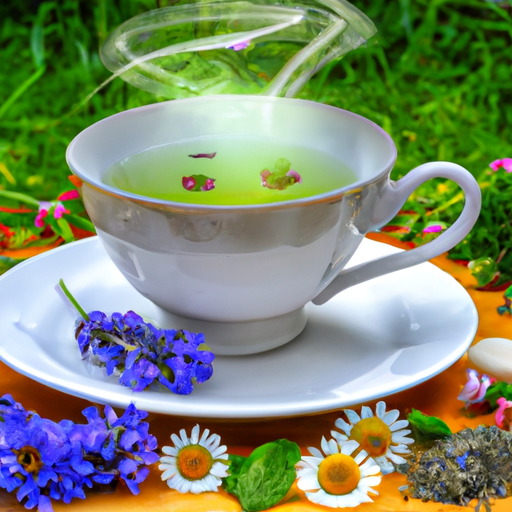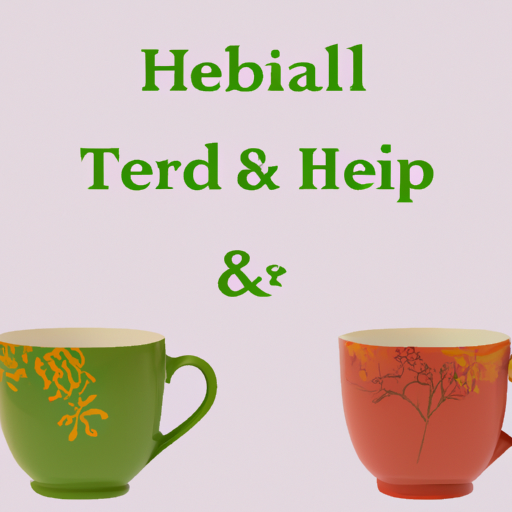Picture your stomach feeling like a blown-up balloon, leading to discomfort and a sensation of heaviness. Bloating is a common issue that impacts numerous individuals, disrupting our daily routines and leaving us with a sluggish sensation.
But fear not, for relief may come in the form of a soothing cup of herbal tea.
Just like a gentle breeze that deflates a balloon, certain herbal teas have been known to alleviate bloating and promote digestive wellness. These natural remedies can help ease the discomfort and restore a sense of lightness to your belly.
In this article, I will explore the best herbal teas for bloating, backed by evidence and centuries of traditional use. From the calming chamomile to the invigorating ginger, we will delve into the properties and benefits of each herbal tea. By understanding their unique qualities, you can choose the perfect cuppa to aid in your bloating relief.
So, let’s embark on this journey of herbal remedies and discover which tea will be your bloating’s greatest foe.
Key Takeaways
- Chamomile tea can relax the muscles of the gastrointestinal tract and reduce gas and bloating.
- Peppermint tea can relax the muscles of the gastrointestinal tract and reduce bloating and gas.
- Ginger tea stimulates the digestive system and can reduce bloating and flatulence.
- Fennel tea can relax the muscles in the gastrointestinal tract and promote better digestion.
Chamomile Tea
If you’re looking for a soothing herbal tea to relieve bloating, chamomile tea is your best bet – it’s like a warm and comforting hug for your digestive system.
Chamomile has been used for centuries for its medicinal properties and is known for its calming effects on the body.
When it comes to bloating, chamomile tea can help relax the muscles of the gastrointestinal tract, reducing gas and bloating. It also has anti-inflammatory properties that can soothe an irritated stomach.
Additionally, chamomile tea is easy to incorporate into your daily routine. You can simply steep a chamomile tea bag in hot water for a few minutes, or get creative with chamomile-infused recipes like chamomile lemonade or chamomile smoothies.
Moving on to peppermint tea, another great option for bloating relief…
Peppermint Tea
When you sip on a warm cup of peppermint tea, you can almost feel the soothing coolness of the mint leaves dancing on your tongue. Peppermint tea isn’t just a refreshing beverage, but it’s also a natural remedy for bloating. It contains compounds like menthol that’ve been found to relax the muscles of the gastrointestinal tract, relieving symptoms of bloating and gas.
Additionally, peppermint tea has antimicrobial properties that may help reduce the overgrowth of bacteria in the gut, which can contribute to bloating. To make peppermint tea, simply steep a handful of fresh or dried peppermint leaves in boiling water for about 5-10 minutes. Strain and enjoy the invigorating aroma and taste.
Now, let’s move on to the next herbal tea for bloating: ginger tea.
Ginger Tea
Ginger tea is an excellent choice for promoting a healthy digestive system. It stimulates the digestive system, helping to increase the production of digestive enzymes and speed up the digestion process. This can be particularly helpful for reducing bloating and flatulence.
Additionally, ginger tea has been used for centuries to relieve nausea, making it a great option for those who experience digestive discomfort.
Stimulates Digestive System
Peppermint tea, with its refreshing and soothing properties, is a fantastic herbal remedy that stimulates the digestive system. It is a popular choice for herbal teas for digestion due to its numerous benefits. This aromatic tea contains menthol, which relaxes the muscles of the gastrointestinal tract and promotes better digestion. Peppermint tea can help relieve symptoms such as indigestion, stomach cramps, and nausea. To incorporate peppermint tea into your daily routine for better digestion, simply steep a peppermint tea bag in hot water for about 5-7 minutes and enjoy it after meals. The cooling and calming effect of peppermint tea can not only aid digestion but also reduce bloating and flatulence, providing relief from discomfort.
Reduces Bloating and Flatulence
One sip of this aromatic infusion and the discomfort of a bloated and gassy stomach melts away like a deflating balloon. When it comes to reducing bloating naturally, herbal remedies can be a game-changer. Here are three herbal teas that have been proven to help reduce bloating and flatulence:
-
Peppermint tea: Peppermint’s ability to relax the muscles of the gastrointestinal tract allows gas to pass more easily and relieves bloating.
-
Ginger tea: Ginger has long been used as a remedy for digestive issues, including bloating. It has anti-inflammatory properties that can soothe the digestive system and reduce bloating.
-
Chamomile tea: Chamomile is not only calming for the mind but also for the stomach. It can help relax the muscles of the digestive tract, reducing bloating and discomfort.
These herbal teas offer a natural and effective way to alleviate bloating and flatulence. They can be enjoyed throughout the day to support digestive health. Transitioning into the next section about relieving nausea, these teas can also provide relief from stomach discomfort.
Relieves Nausea
Chamomile tea is known for its ability to provide relief from nausea, making it a soothing and natural option for those experiencing stomach discomfort. The calming properties of chamomile help to relax the muscles in the gastrointestinal tract, which can alleviate feelings of queasiness and reduce the urge to vomit. Additionally, chamomile tea has been found to relieve motion sickness and soothe an upset stomach. It contains compounds that have anti-inflammatory and antispasmodic effects, further aiding in reducing nausea.
To illustrate the effectiveness of chamomile tea in relieving nausea, here is a comparison table:
| Chamomile Tea |
|---|
| Relieves Nausea |
| Reduces Motion Sickness |
| Soothes Upset Stomach |
| Anti-inflammatory and Antispasmodic Properties |
Now, let’s move on to the next tea that can help with bloating and digestive issues: fennel tea.
Fennel Tea
For an incredibly soothing experience, you should definitely try sipping on a cup of delightful fennel tea to alleviate bloating. Fennel tea is known for its numerous benefits, making it a popular choice for those seeking relief from digestive issues.
Here are three reasons why fennel tea is a great choice for bloating:
-
Fennel tea benefits: Fennel has been used for centuries to aid digestion and reduce bloating. It contains compounds that help relax the muscles in the gastrointestinal tract, promoting better digestion and relieving discomfort.
-
Fennel tea recipe: Making fennel tea is easy. Simply steep one teaspoon of crushed fennel seeds in a cup of hot water for about 10 minutes. Strain and enjoy!
-
Natural remedy: Fennel tea provides a natural and gentle way to alleviate bloating without relying on harsh medications or treatments.
Now, let’s transition to the next section where we will explore the benefits of lemon balm tea.
Lemon Balm Tea
Lemon Balm Tea is a herbal tea that’s known to calm the stomach and provide relief from bloating and indigestion. It contains natural compounds that help relax the muscles of the digestive tract, easing discomfort and promoting healthy digestion.
Additionally, Lemon Balm Tea has been found to have a soothing effect on the nervous system, making it an effective remedy for relieving nervous tension.
Calms the Stomach
Looking to soothe your upset stomach? Try sipping on a refreshing cup of peppermint tea. Peppermint tea is one of the best herbal teas for digestion and is known for its calming properties.
It contains menthol, which helps relax the muscles of the gastrointestinal tract, relieving symptoms of bloating, gas, and stomach discomfort. Scientific studies have shown that peppermint tea can help reduce spasms in the intestines and promote healthy digestion.
Additionally, peppermint tea has been used for centuries as a natural remedy for indigestion and nausea. Its soothing effects can help alleviate stomach pain and discomfort. So if you’re experiencing an upset stomach, reach for a cup of peppermint tea to calm your stomach and reduce bloating and indigestion.
Reduces Bloating and Indigestion
After discussing herbal teas that calm the stomach, let’s now explore teas that can help reduce bloating and indigestion. These teas are known for their ability to improve digestion and provide relief from discomfort. One such herbal tea is peppermint tea, which contains menthol that helps relax the muscles of the gastrointestinal tract, reducing bloating and promoting smoother digestion. Another option is ginger tea, which has been used for centuries to aid digestion and alleviate bloating. Ginger contains compounds that stimulate the digestive system, helping to break down food and reduce gas. To paint a clearer picture, here is a table comparing the properties of these two teas:
| Herbal Tea | Reduces Bloating | Improves Digestion |
|---|---|---|
| Peppermint | Yes | Yes |
| Ginger | Yes | Yes |
Now, let’s move on to the next section, where we’ll discuss herbal teas that relieve nervous tension.
Relieves Nervous Tension
Chamomile tea is a popular choice for individuals seeking relief from nervous tension, as it’s believed to have calming properties that can help reduce anxiety and promote relaxation. This herbal tea has been used for centuries as a natural remedy for anxiety and is often recommended as a safe and effective way to alleviate nervous tension.
Chamomile tea is rich in antioxidants and flavonoids, which’ve been shown to have a calming effect on the central nervous system. These compounds may help to reduce feelings of anxiety and promote a sense of calmness. Additionally, chamomile tea is known for its mild sedative properties, which can further aid in relaxation.
As we transition into discussing dandelion tea, it’s worth noting that this herbal tea also offers potential benefits for bloating and indigestion.
Dandelion Tea
To alleviate bloating, you should definitely try a cup of refreshing dandelion tea—it’s the perfect herbal remedy for soothing your tummy troubles! Dandelion tea is known for its numerous benefits, including its ability to relieve bloating and aid digestion.
This herbal tea is made from the leaves and roots of the dandelion plant, which are rich in vitamins and minerals that promote healthy digestion. For a simple dandelion tea recipe, you can steep dried dandelion leaves in hot water for about 5-10 minutes. The resulting tea has a slightly bitter taste, but you can add honey or lemon to enhance the flavor.
As we transition to the subsequent section about the ‘peppermint and ginger blend,’ it’s important to note that dandelion tea can be a great option for relieving bloating, but there are other herbal teas that can also provide relief.
Peppermint and Ginger Blend
You’ll love the invigorating combination of peppermint and ginger in this blend, as it’s like a breath of fresh air for your digestive system. Peppermint, known for its refreshing and soothing properties, has been used for centuries to aid digestion. It helps relax the muscles of the gastrointestinal tract, reducing spasms and relieving bloating.
Additionally, peppermint has been found to have antimicrobial properties, which may help in combating harmful bacteria in the gut. On the other hand, ginger has long been used to alleviate digestive discomfort. It stimulates the production of digestive enzymes, helping to break down food and promote smooth digestion.
Ginger also has anti-inflammatory effects, which can reduce inflammation in the gut and ease bloating. Together, the combination of peppermint and ginger in this blend offers a natural and effective remedy for bloating.
Frequently Asked Questions
Are there any potential side effects or risks associated with drinking herbal teas for bloating?
Potential risks and side effects of herbal teas for bloating include allergic reactions, digestive upset, and interactions with medications or medical conditions. Safety concerns exist for pregnant or breastfeeding women. It’s important to follow recommended dosage and frequency, and prepare teas properly for maximum effectiveness.
Can herbal teas for bloating be consumed during pregnancy or while breastfeeding?
Herbal teas during pregnancy and while breastfeeding should be consumed with caution. Some herbal teas, like chamomile, are generally considered safe, but it’s important to consult with a healthcare provider to ensure safety for both mom and baby.
What is the recommended dosage or frequency of drinking herbal teas for bloating?
The recommended dosage and frequency of drinking herbal teas for bloating may vary depending on the specific tea and individual needs. It is important to consult with a healthcare professional for personalized advice on herbal tea efficacy and usage.
Are there any specific instructions on how to prepare herbal teas for maximum effectiveness in reducing bloating?
To brew herbal tea for maximum effectiveness in reducing bloating, follow these instructions: Boil water, add herbs, steep for 5-10 minutes, strain, and enjoy. Steeping time can vary based on personal preference and desired strength.
Can herbal teas for bloating interact with any medications or medical conditions?
Herbal teas for bloating can interact with certain medications. It is important to consult with a healthcare professional before using them, especially if you have any medical conditions. The effectiveness of herbal teas may vary depending on the specific medical condition.
Conclusion
In conclusion, when it comes to finding the best herbal tea for bloating, there are several options to consider. Chamomile tea, peppermint tea, ginger tea, fennel tea, lemon balm tea, and dandelion tea have all been shown to have beneficial effects on bloating and digestion. However, one might argue that these teas are just temporary fixes and don’t address the underlying causes of bloating.
While it’s true that addressing the root cause is important, incorporating these herbal teas into your routine can provide relief and support overall digestive health.










